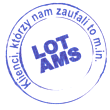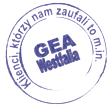What are stacker cranes?
Warehouse stacker cranes are a tool that facilitates the storage of materials. They work by moving along the racks located in the warehouse. They are very efficient machines that make it possible to speed up the process of loading goods. Such complex machines require special checks to be carried out at regular intervals, and these can only be carried out by authorised personnel. Like many advanced machines registered with the Office of Technical Inspection, the stacker cranes also require their own inspections and maintenance work. In order to carry out such work, a person is required to hold an UDT authorisation for stacker cranes. They are a very effective tool and bring many advantages of use such as:
- automatic loading and unloading, without the need for employee intervention,
- carrying out checks and updating the stock held,
- simplicity in maintenance and operation of the unit,
- the absence of mistakes that could arise from manual work performed by humans,
- well-coordinated operation and smooth movement of the machine.
If we consider the type of control of the stacker cranes we can distinguish:
- automatic control,
- semi-automatic control,
- manual control.
Stacker cranes use the following instruments to move and retrieve goods:
- pitchforks,
- grippers,
- conveyors.
Warehouse stacker cranes also differ in construction, so they can be divided into:
- Column stacker cranes - built in the form of a mobile pole,
- frame stacker cranes - constructed in the form of a gantry driving along the shelf.
These machines are powered by an electric drive and have their own microprocessors, so that no human intervention is needed for their operation. The stacker cranes can handle one aisle as well as several. Knowledge of the operation, design and materials of the stacker cranes is essential in order to perform maintenance work on these machines.
UDT authorisation for stacker cranes
The path to gaining a specialist UDT qualification is through undergoing appropriate courses in operation and maintenance work. Many companies offer their employees training consisting of theoretical knowledge and practical exercises. If the boss would like his or her employees to be appropriately certified to carry out maintenance, he or she can take advantage of one of the many offers from companies providing such training. In addition, at the end of the learning process, it is necessary to take an examination in front of a board, and only by receiving a positive result does it become possible to grant the authorisations of the Office of Technical Inspection. Stacker cranes must be subjected to various types of tests from time to time, and to be able to take them at all, the machine must be:
- properly assembled and constructed,
- technically sound and in perfect working order,
- ready for operation under predefined conditions.
The conditions that must be met for the study to take place are:
- good lighting and unobstructed visibility,
- no health hazards or exceeded low or high temperature limits.
During the conduct of the research, the following must be present:
- operator,
- the person responsible for maintenance,
- operator.
The equipment is subject to tests such as:
- periodic - the timing of the tests depends on the type of equipment and is different for everyone,
- ad hoc - in this case, the timing of the examination depends on the individual needs of the employees,
- post-accident or post-failure - these are carried out after any mishaps or detected technical failures.
The role of maintenance
Keeping these types of tools clean, accident-free and operational is not the easiest thing to do. However, maintenance work backed up by proper testing from time to time allows these machines to operate safely and efficiently. It is very important that there are properly trained people in the workplace who are certified to carry out maintenance work. If you or your employees have plans to develop in the industrial sector with loading and unloading work, they should attend a special UDT training course. This prepares you to obtain specialised certificates from the Office of Technical Inspection and will streamline the whole process of your company. The choice of offerings is really wide, and it is up to you to decide which training you ultimately decide on.






































